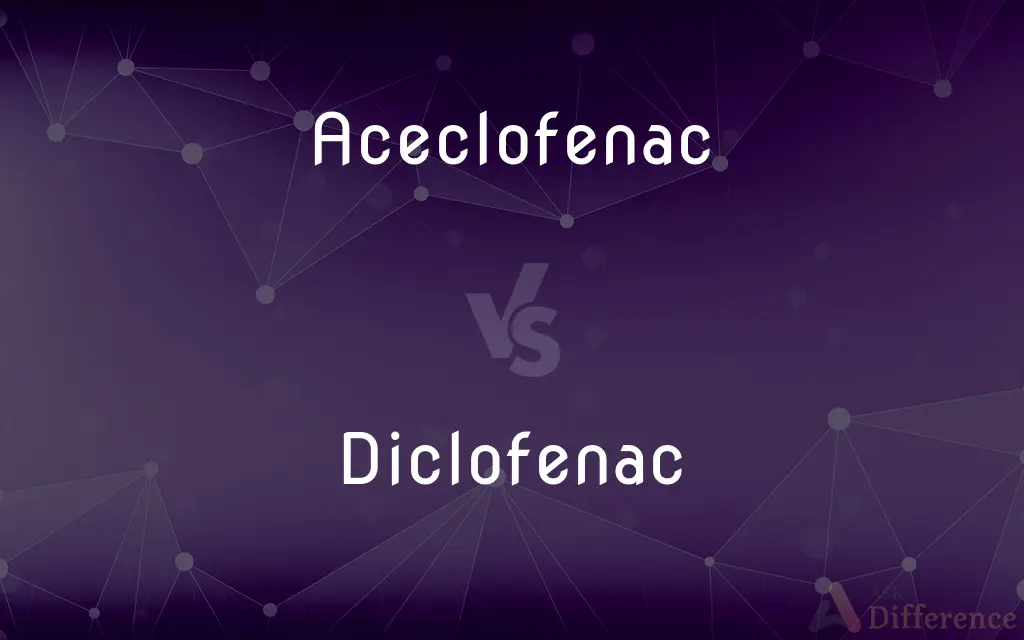Aceclofenac vs. Diclofenac — What's the Difference?
By Tayyaba Rehman — Updated on October 13, 2023
Aceclofenac and Diclofenac are both non-steroidal anti-inflammatory drugs (NSAIDs), but Aceclofenac is a derivative of Diclofenac and may have different pharmacokinetics.

Difference Between Aceclofenac and Diclofenac
Table of Contents
ADVERTISEMENT
Key Differences
Aceclofenac and Diclofenac both belong to the non-steroidal anti-inflammatory drug (NSAID) family, which means they help reduce inflammation, pain, and fever. While Diclofenac has been around for a longer time and is widely recognized, Aceclofenac is a derivative of Diclofenac.
In terms of chemical structure, Aceclofenac is derived from Diclofenac by the addition of an acetyl group. This alteration can lead to differences in the way the drug behaves in the body, even though the primary mechanism of action for both drugs remains inhibiting the enzymes that produce prostaglandins, which are responsible for pain and inflammation.
From a clinical perspective, both Aceclofenac and Diclofenac are used to treat similar conditions like arthritis, ankylosing spondylitis, and other inflammatory conditions. However, the preference for one over the other may depend on patient-specific factors, physician experience, or the specific condition being treated.
As with any medication, both Aceclofenac and Diclofenac come with their own set of potential side effects. Due to the differences in their chemical structure, there may be variations in the side effect profiles of these drugs. Both, however, can affect the stomach, heart, or kidneys if taken inappropriately.
It's essential to understand that while Aceclofenac and Diclofenac are related and have many similarities, they are distinct medications. Like any medication, they should be taken under the guidance of a healthcare professional who will consider the specific needs and health status of the patient.
ADVERTISEMENT
Comparison Chart
Drug Class
Non-steroidal anti-inflammatory drug (NSAID)
Non-steroidal anti-inflammatory drug (NSAID)
Chemical Derivation
Derived from Diclofenac by adding an acetyl group
Original compound
Primary Use
Arthritis, ankylosing spondylitis, other inflammatory conditions
Arthritis, ankylosing spondylitis, migraines, etc.
Pharmacokinetics
Might differ due to its distinct chemical structure
Established pharmacokinetics
Side Effect Profile
Can affect stomach, heart, kidneys, etc.
Can affect stomach, heart, kidneys, etc.
Compare with Definitions
Aceclofenac
A non-steroidal anti-inflammatory drug used to treat pain and inflammation.
Her doctor prescribed Aceclofenac for her rheumatoid arthritis pain.
Diclofenac
A common drug choice for conditions like arthritis and migraines.
He has been using Diclofenac for years to manage his chronic headaches.
Aceclofenac
A derivative of the NSAID Diclofenac, with anti-inflammatory properties.
Aceclofenac is often considered when patients cannot tolerate certain other NSAIDs.
Diclofenac
A widely recognized and prescribed NSAID with known efficacy.
Diclofenac has been a go-to medication for many rheumatologists for years.
Aceclofenac
An analgesic primarily used for osteoarthritis and rheumatoid arthritis.
With Aceclofenac, she noticed a significant reduction in her joint pain.
Diclofenac
An NSAID medication used to reduce inflammation and pain.
Diclofenac provided relief from her post-operative pain.
Aceclofenac
A drug often chosen for its potentially favorable side effect profile compared to other NSAIDs.
He was switched to Aceclofenac due to concerns about gastrointestinal effects.
Diclofenac
A potent inhibitor of prostaglandin synthesis, thereby reducing pain.
The action of Diclofenac in the body reduces the chemicals that cause pain.
Aceclofenac
A medication inhibiting enzymes producing pain-causing prostaglandins.
Aceclofenac works by targeting the root cause of inflammation in the body.
Diclofenac
Available in various forms like gels, patches, and oral tablets.
She preferred the topical Diclofenac gel for her localized knee pain.
Aceclofenac
Aceclofenac is a nonsteroidal anti-inflammatory drug (NSAID) analog of diclofenac. It is used for the relief of pain and inflammation in rheumatoid arthritis, osteoarthritis and ankylosing spondylitis.
Diclofenac
Diclofenac, sold under the brand name Voltaren among others, is a nonsteroidal anti-inflammatory drug (NSAID) used to treat pain and inflammatory diseases such as gout. It is taken by mouth, rectally in a suppository, used by injection, or applied to the skin.
Aceclofenac
(pharmaceutical drug) A nonsteroidal anti-inflammatory drug.
Diclofenac
A nonsteroidal anti-inflammatory drug, C14H11Cl2 NO2, used in the form of its potassium salt to treat pain.
Diclofenac
(pharmaceutical drug) A painkiller having the chemical formula C14H11Cl2NO2
Common Curiosities
How is "Aceclofenac" pronounced?
Ace-clo-fen-ac.
What type of drug is Aceclofenac?
It is a non-steroidal anti-inflammatory drug (NSAID).
What is Aceclofenac used to treat?
It's primarily used to relieve pain and inflammation in conditions like rheumatoid arthritis and osteoarthritis.
Is Aceclofenac suitable for all age groups?
Not typically recommended for children and certain elderly individuals. Doctor’s advice is crucial.
Can Aceclofenac be taken during pregnancy?
It is generally not recommended during pregnancy; consultation with a healthcare professional is essential.
Can Diclofenac cause an allergic reaction?
Yes, it can cause allergic reactions in some people.
What is Diclofenac used for?
It is used to treat pain, inflammatory disorders, and dysmenorrhea.
Can Aceclofenac cause any side effects?
Yes, it can cause side effects like stomach pain, nausea, and heartburn among others.
How should Diclofenac be stored?
It should be stored in a cool, dry place, away from light and out of reach of children.
How is Aceclofenac administered?
It is typically administered orally, via tablets.
Is Aceclofenac available over the counter?
In some countries it requires a prescription, while it may be over-the-counter in others.
How do you pronounce "Diclofenac"?
Dye-klo-fen-ak.
Is Diclofenac suitable for animals?
In veterinary medicine, Diclofenac is sometimes used but under strict veterinary guidance.
Is Diclofenac safe for everyone to use?
Not for everyone; individuals with certain health conditions or taking specific medications should avoid it.
In what forms is Diclofenac available?
It's available in various forms, including tablets, gels, and injection.
Share Your Discovery

Previous Comparison
Roti vs. Paratha
Next Comparison
Bracelet vs. NecklaceAuthor Spotlight
Written by
Tayyaba RehmanTayyaba Rehman is a distinguished writer, currently serving as a primary contributor to askdifference.com. As a researcher in semantics and etymology, Tayyaba's passion for the complexity of languages and their distinctions has found a perfect home on the platform. Tayyaba delves into the intricacies of language, distinguishing between commonly confused words and phrases, thereby providing clarity for readers worldwide.













































